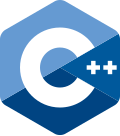C++
Guā-māu
 Logo endorsed by the C++ standards committee | |
| Pian-têng hoān-hêngs | Multi-paradigm: procedural, imperative, functional, object-oriented, generic, modular |
|---|---|
| Gí-giân ka-cho̍k | C |
| Nńg-thé siat-kè | Bjarne Stroustrup |
| Têng-sek-goân | ISO/IEC JTC 1 (Joint Technical Committee 1) / SC 22 (Subcommittee 22) / WG 21 (Working Group 21) |
| Siú-chhù hoat-hêng | 1985 nî |
| Ún-tēng pán-pún |
C++20 (ISO/IEC 14882:2020)
/ 2020 nî 12 goe̍h 15 ji̍t |
| Ū-lám pán-pún |
C++23
/ 2022 nî 3 goe̍h 17 ji̍t |
| Lūi-hêng hē-thóng | Static, nominative, partially inferred |
| OS | Cross-platform |
| Bûn-kiāⁿ khok-tián-miâ | .C, .cc, .cpp, .cxx, .c++, .h, .H, .hh, .hpp, .hxx, .h++ |
| Bāng-chām |
isocpp |
| Chú-iàu gí-giân si̍t-chò | |
| Pang-bô͘:Nowraplinks | |
| Khé-hoat gí-giân | |
| Ada, ALGOL 68,[1] BCPL,[2] C, CLU,[1] ML, Mesa,[1] Modula-2,[1] Simula, Smalltalk[1] | |
| Éng-hióng gí-giân | |
| Ada 95, C#,[3] C99, Chapel,[4] Clojure,[5] D, Java,[6] JS++,[7] Lua, Nim,[8] Objective-C++, Perl, PHP, Python,[9] Rust, Seed7 | |
| |
C++ (Eng-gí kóng-hoat: C plus plus; "C ka ka") sī chi̍t khoán thêng-sek gí-giân, ū thong-ēng-sèng (generic), bēng-lēng-sèng (imperative) kap bu̍t-kiāⁿ tō-hiòng (object-oriented) ê te̍k-sek. Lēng-gōa i mā sǹg sī khah hong-piān chhù-lí kē-chân (tùi ke-khì kì-e̍k-thé ê chhau-chok) tāi-chì ê gí-giân.
Chá-kî khai-hoat-chiá sī Bell Si̍t-giām-só͘ ê Bjarne Stroustrup, 1983 nî hoat-pò͘.
Tsù-kái
[siu-kái | kái goân-sí-bé]- ↑ 1.0 1.1 1.2 1.3 1.4 Stroustrup, Bjarne (1996). "A history of C++: 1979-1991". History of programming languages---II. ACM. pp. 699–769. doi:10.1145/234286.1057836.
- ↑ Stroustrup, Bjarne (December 16, 2021). "C++20: Reaching for the Aims of C++ - Bjarne Stroustrup - CppCon 2021". CppCon.
- ↑ Naugler, David (May 2007). "C# 2.0 for C++ and Java programmer: conference workshop". Journal of Computing Sciences in Colleges. 22 (5).
Although C# has been strongly influenced by Java it has also been strongly influenced by C++ and is best viewed as a descendant of both C++ and Java.
- ↑ "Chapel spec (Acknowledgements)" (PDF). Cray Inc. 1 October 2015. goân-loē-iông (PDF) tī 24 June 2018 hőng khó͘-pih. 14 January 2016 khòaⁿ--ê.
- ↑ "Rich Hickey Q&A by Michael Fogus". goân-loē-iông tī 2017-01-11 hőng khó͘-pih. 2017-01-11 khòaⁿ--ê.
- ↑ Harry. H. Chaudhary (28 July 2014). "Cracking The Java Programming Interview :: 2000+ Java Interview Que/Ans". goân-loē-iông tī 27 May 2021 hőng khó͘-pih. 29 May 2016 khòaⁿ--ê.
- ↑ Roger Poon (1 May 2017). "Scaling JS++: Abstraction, Performance, and Readability". goân-loē-iông tī 11 May 2020 hőng khó͘-pih. 21 April 2020 khòaⁿ--ê.
- ↑ "FAQ Nim Programming Language". goân-loē-iông tī 11 July 2017 hőng khó͘-pih. 2020-04-21 khòaⁿ--ê.
- ↑ "9. Classes — Python 3.6.4 documentation". docs.python.org. goân-loē-iông tī 23 October 2012 hőng khó͘-pih. 2018-01-09 khòaⁿ--ê.
Tsham-ua̍t
[siu-kái | kái goân-sí-bé]- Liông-chí tiān-náu (Liông-tsí tiān-náu/quantum computer)
